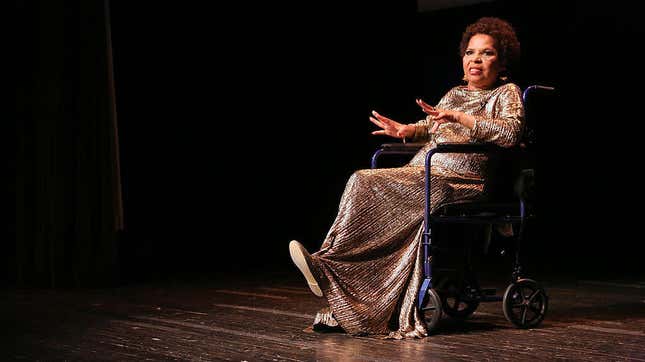
While it’s widely celebrated as a major work of American theater, Ntozake Shange’s For Colored Girls Who Have Considered Suicide / When the Rainbow Is Enuf is rarely professionally performed onstage. That’s changing beginning in October when the choreopoem will be revived at New York’s Public Theater, the stage where For Colored Girls premiered over 40 years ago in 1976 before heading to Broadway.
“She wanted a rainbow of women on that stage, and I gave her that,” Shange’s director, Leah C. Gardiner, tells the New York Times. “And it saddens me to the core that she won’t be able to see that.”
That’s because Shange died last October at the age of 70. But Gardiner says she thinks the famed artist would have been pleased by what the new staging of her work will entail.
As the Times explains:
the creative team for the new production will be made up entirely of women of color. Such a collaboration is a rare opportunity in the careers of Martha Redbone, who is composing the show’s original music, and the choreographer Camille A. Brown (“Choir Boy”).
Both Redbone and Brown said they were introduced to For Colored Girls by their families as children.
Redbone’s mother loved the work and presented her with a poster that Redbone hung in her bedroom. Brown said she viewed the same poster hanging on an uncle’s wall.
Doing justice to the classic is a tall order that both take seriously.
“I’m extremely terrified, because it is such a beloved show,” Brown told the Times, sharing that as part of her choreography, she planned to include hip-hop and other modern dance that were not around when For Colored Girls premiered.
Show director Gardiner told the Times that both she and Shange also thought about the ways in which For Colored Girls connected to the zeitgeist of #MeToo, and how the “movement has created space for reclamation of the ‘black girl’s song,’” or black women’s “self-ownership: owning our bodies, owning our hair, owning our skin.”
As Shange wrote of her work in 2010, the year director Tyler Perry released his film version of For Colored Girls, according to the Times:
“‘For Colored Girls’ was meant for women of color. ‘For Colored Girls’ still is a women’s trip, and the connection we can make through it, with each other and for each other, is to empower us all.”
“It’s an absolute weapon, this play,” Gardiner said. “It’s a political weapon. But so are all plays.”
For Colored Girls starts previews at the Public Theater on Oct. 8.

